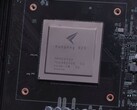China is continuing its efforts to reduce reliance on U.S.-related technology, as it is steadily increasing its “home-grown” processors production capacities. While there appears to be a tendency to promote the open-source RISC-V microarchitecture, Via Technologies subsidiary Zhaoxin is also patenting the more popular x86-64 microarchitecture that is presently included in consumer-grade CPUs from Intel and AMD, just to maintain maximum compatibility on the software side. This is also the case for the new KaiXian KX-6780A octa-core CPU that is specifically designed for the DIY gamers who are looking to build an affordable mini-ITX gaming rig.
Now, the performance of these CPUs is still nowhere near the mainstream solutions offered by Intel or AMD. Back in 2019, Zhaoxin announced that the the first KX-6000 processors should match the gen 7 quad-core i5 CPUs with no hyperthreading from Intel, but it looks like not much has improved in the meantime, at least not for the mainstream models that are still manufactured on TSMC’s old 16 nm nodes. Zhaoxin also offers laptop and server-grade chips, but reviews for those models are hard to find.
Specs for the KaiXian KX-6780A include 8 MB of L2 cache, dual-channel support for DDR4-3200 RAM, the usual SATA 3 / USB 3.1 / PCIe 3.0 connectivity, plus an integrated GPU supporting DX 11.1. This CPU uses a superscalar multi-issue, out-of-order microarchitecture compatible with SSE 4.2 instruction sets, AVX virtualization and the latest encryption standards. This CPU is expected to be launched this March, but it will only be available in pre-built systems, as it uses BGA packaging and needs to be sold together with a compatible motherboard.
PC maker Xinyingjie already announced that it will offer the KX-U6780A CPU together with a Cjoyin C1888 mini-ITX motherboard that has a single PCIe 3.0 X16 slot, two SO-DIMMS and an M.2 slot for storage solutions all packed up in a small form-factor case. A prototype test coming from a Chinese Youtube reviewer revealed that the CPU cannot yet match the aforementioned i5 from Intel, but the PC maker promised to further tweak the performance, so it may improve by March.
I first stepped into the wondrous IT&C world when I was around seven years old. I was instantly fascinated by computerized graphics, whether they were from games or 3D applications like 3D Max. I'm also an avid reader of science fiction, an astrophysics aficionado, and a crypto geek. I started writing PC-related articles for Softpedia and a few blogs back in 2006. I joined the Notebookcheck team in the summer of 2017 and am currently a senior tech writer mostly covering processor, GPU, and laptop news.
> Expert Reviews and News on Laptops, Smartphones and Tech Innovations > News > News Archive > Newsarchive 2020 01 > Chinese CPUs on the rise: Zhaoxin’s KaiXian KX-6780A octa-core to soon launch with dedicated mini-ITX motherboard
Bogdan Solca, 2020-01-30 (Update: 2020-01-30)


















